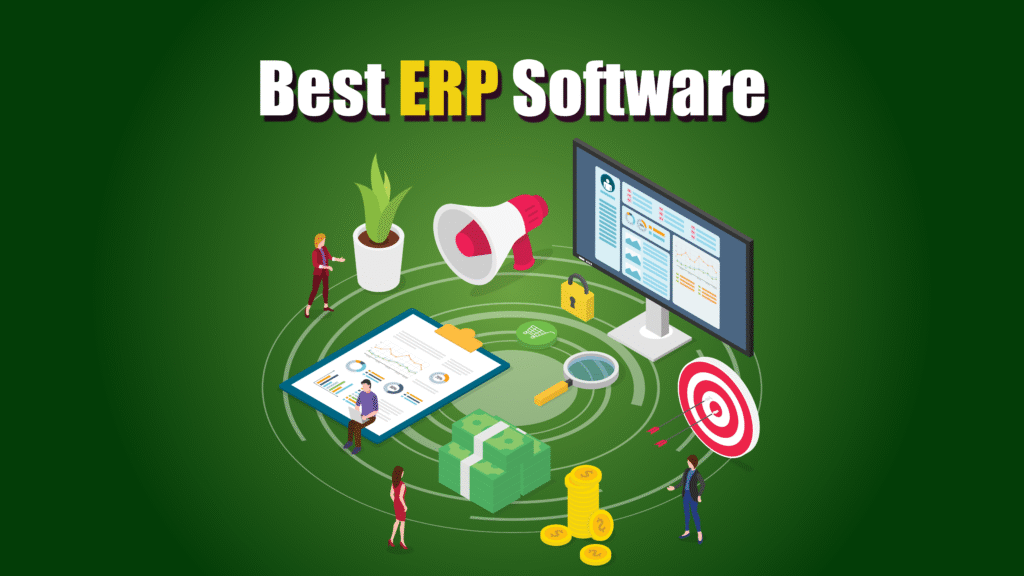Managing business operations can be overwhelming without the right systems in place. From finance and inventory to human resources and customer relationships, juggling multiple processes manually often leads to errors, inefficiencies, and missed opportunities.
ERP (Enterprise Resource Planning) software solves this problem by unifying all key business functions into a single, integrated platform. It streamlines workflows, improves data accuracy, and provides real-time insights, helping businesses make smarter decisions and operate more efficiently.
In this article, we’ve carefully researched and selected the 15 best ERP software solutions in 2026. Whether you run a small business, a growing enterprise, or a large corporation, these platforms can help you optimize operations, enhance productivity, and scale your business with confidence.
What is ERP Software?
Enterprise Resource Planning (ERP) software is an integrated digital solution that helps businesses manage core functions such as accounting, inventory, procurement, HR, customer relationship management (CRM), and supply chain operations—all from a centralized platform. Instead of using multiple disconnected tools for each department, ERP software unifies business processes, ensures real-time data flow, and improves overall efficiency and decision-making.
ERP systems are widely used across industries—by manufacturers, service providers, wholesalers, and enterprises—to streamline workflows, reduce manual tasks, and maintain operational visibility. Whether deployed in the cloud or on-premises, ERP software serves as the backbone of modern businesses by automating processes and offering a single source of truth for data.
Why is there a Need for ERP Software?
In today’s competitive and fast-changing business environment, companies must operate with speed, accuracy, and adaptability. Managing different departments with siloed tools often leads to data inconsistencies, delayed reporting, and operational bottlenecks. This is where ERP software becomes crucial.
- Centralized Business Operations: ERP platforms bring together key business functions like finance, sales, inventory, HR, and procurement into one cohesive system, improving collaboration and efficiency across departments.
- Real-Time Data and Insights: With all data in one place, businesses can generate real-time reports and dashboards, enabling faster decision-making and improved forecasting.
- Process Automation: ERP systems eliminate manual and repetitive tasks by automating workflows—saving time, reducing errors, and increasing productivity.
- Scalability and Flexibility: Whether you’re a small business or a global enterprise, ERP software grows with you. Cloud-based ERPs especially offer the flexibility to add users, modules, or locations as needed.
- Compliance and Risk Management: From tax regulations to audit trails, ERP software helps businesses stay compliant with financial and industry-specific standards—reducing risks and ensuring transparency.
In a world where efficiency, data accuracy, and agility are non-negotiable, ERP software is no longer a luxury—it’s a necessity. It empowers organizations to optimize resources, scale effectively, and maintain a competitive edge in their industry.
How to Choose the Best ERP Software?
When selecting the best ERP (Enterprise Resource Planning) software, businesses need to carefully evaluate their goals, industry needs, and existing workflows. The right ERP system can streamline operations, reduce costs, and enable data-driven decisions. Use the checklist below to compare leading ERP platforms and determine which solution is the best fit for your organization:
- Industry Fit: Some ERP systems are designed for manufacturing, others for finance, retail, or service-based businesses. Make sure the software is tailored to your industry’s specific needs and processes.
- Scalability: Choose a platform that can grow with your business. Whether you’re adding new teams, branches, or product lines, your ERP should easily scale without disrupting operations.
- Deployment Options: Consider whether you need a cloud-based ERP (more flexible, lower upfront cost) or an on-premise ERP (greater control, one-time license). Some solutions offer hybrid models.
- Customization & Flexibility: Your business is unique—your ERP should be too. Look for customizable workflows, dashboards, and modules that adapt to your processes.
- User Interface & Usability: A user-friendly interface encourages adoption. Select ERP software that is intuitive, modern, and easy for employees to navigate.
- Integration Capabilities: Ensure the ERP can integrate seamlessly with your existing tools—such as CRM, HR, eCommerce, or accounting software—for a unified business ecosystem.
- Support & Training: Reliable vendor support, onboarding assistance, and employee training materials are essential for a smooth implementation and long-term success.
- Cost & ROI: ERP pricing can vary widely. Consider both upfront and ongoing costs (subscription fees, maintenance, training) and weigh them against the value and efficiency the system brings.
Choosing the right ERP software is a strategic decision that can transform your operations and fuel long-term growth. The goal is to find a solution that not only meets your current needs but also supports your future vision.
What Are the Top ERP Software in 2026?
Here is the list of the Top ERP Software for 2026 that we recommend exploring—especially if you’re looking to improve operational efficiency, streamline data, and manage your business from a single unified platform.
Here are the names of the 15 Best ERP Software in 2026:
- NetSuite
- Acumatica
- Sage Intacct
- IFS
- Epicor (including Kinetic)
- Microsoft Dynamics 365
- Microsoft Dynamics 365 Business Central (formerly NAV)
- Odoo
- SAP S/4HANA
- Infor CloudSuite Industrial
- Syspro
- Oracle ERP Cloud
- Infor
- SAP ECC
- Workday or Deltek (based on your industry needs)
1- NetSuite
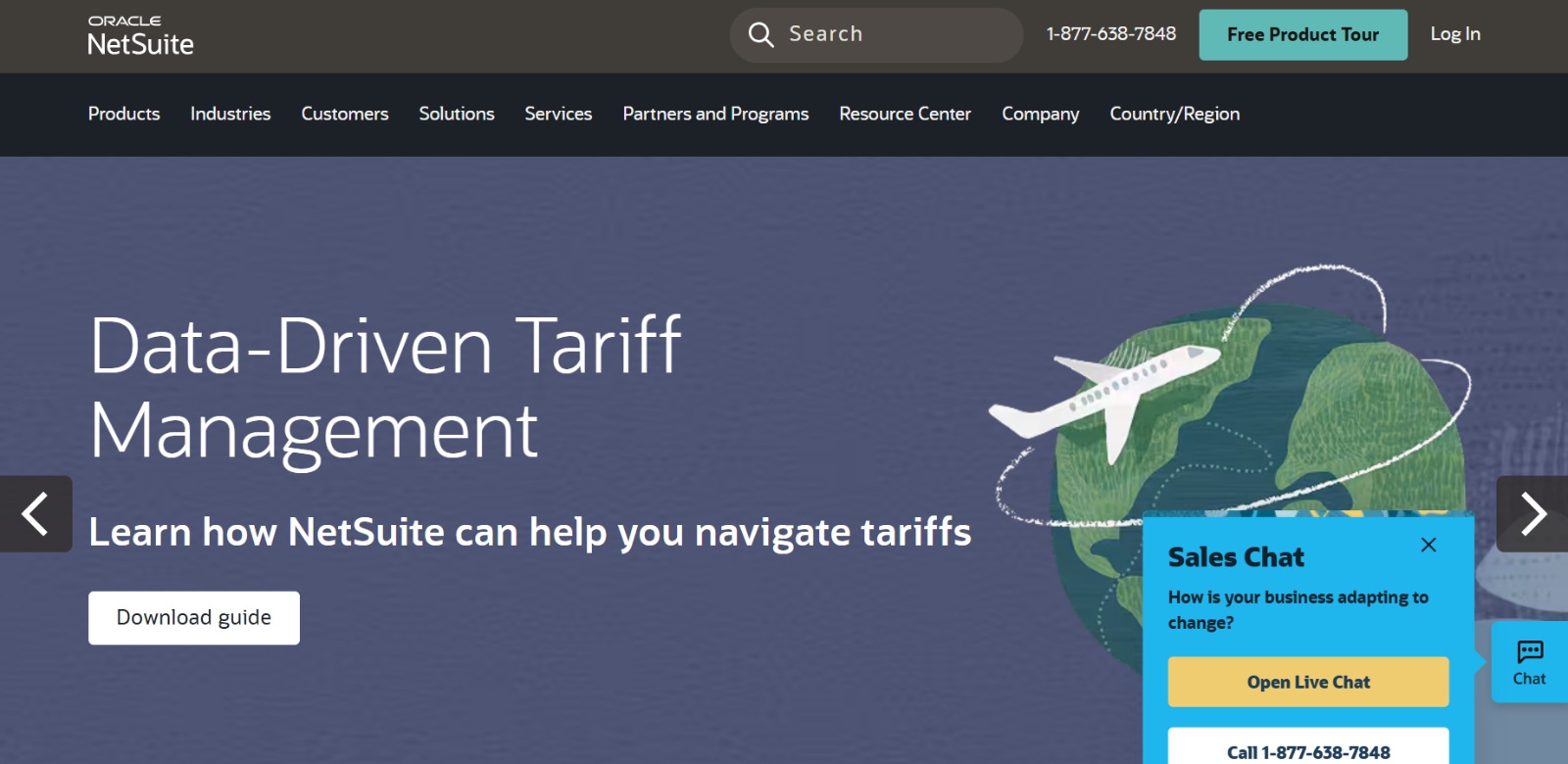
NetSuite by Oracle is one of the most established and widely adopted cloud-based ERP platforms in the world. It offers a comprehensive suite of business applications that support core operations like financial management, CRM, inventory, procurement, HR, and eCommerce—all integrated into a single platform. NetSuite is especially popular among mid-sized businesses and fast-growing enterprises looking for scalability, real-time insights, and automation.
What sets NetSuite apart is its robust functionality, global capabilities, and industry-specific solutions. With powerful customization options and real-time dashboards, it enables companies to streamline operations, improve decision-making, and scale confidently.
Key Features:
- Financial Management: Automates accounting, budgeting, billing, and financial reporting with real-time visibility.
- Inventory & Order Management: Tracks inventory, manages supply chain workflows, and optimizes fulfillment.
- Customer Relationship Management (CRM): Centralized customer data, sales tracking, and support tools.
- eCommerce Integration: Unified platform for back-office and online storefront operations.
- Global Business Management: Multi-currency, multi-language, and tax compliance support for global enterprises.
- Analytics & Reporting: Customizable dashboards, KPIs, and real-time business intelligence tools.
Benefits:
- Scalable and flexible to meet the needs of growing businesses
- Cloud-based with real-time access from anywhere
- Reduces operational costs by unifying all core business processes
- Strong ecosystem of integrations and third-party apps
- Backed by Oracle’s infrastructure and security standards
Use Case:
Perfect for mid-sized to large businesses seeking a robust, cloud-based ERP platform to manage complex operations across departments and geographies. Whether you’re a service provider, manufacturer, or retailer, NetSuite provides the agility and depth to support sustainable growth.
2- Acumatica
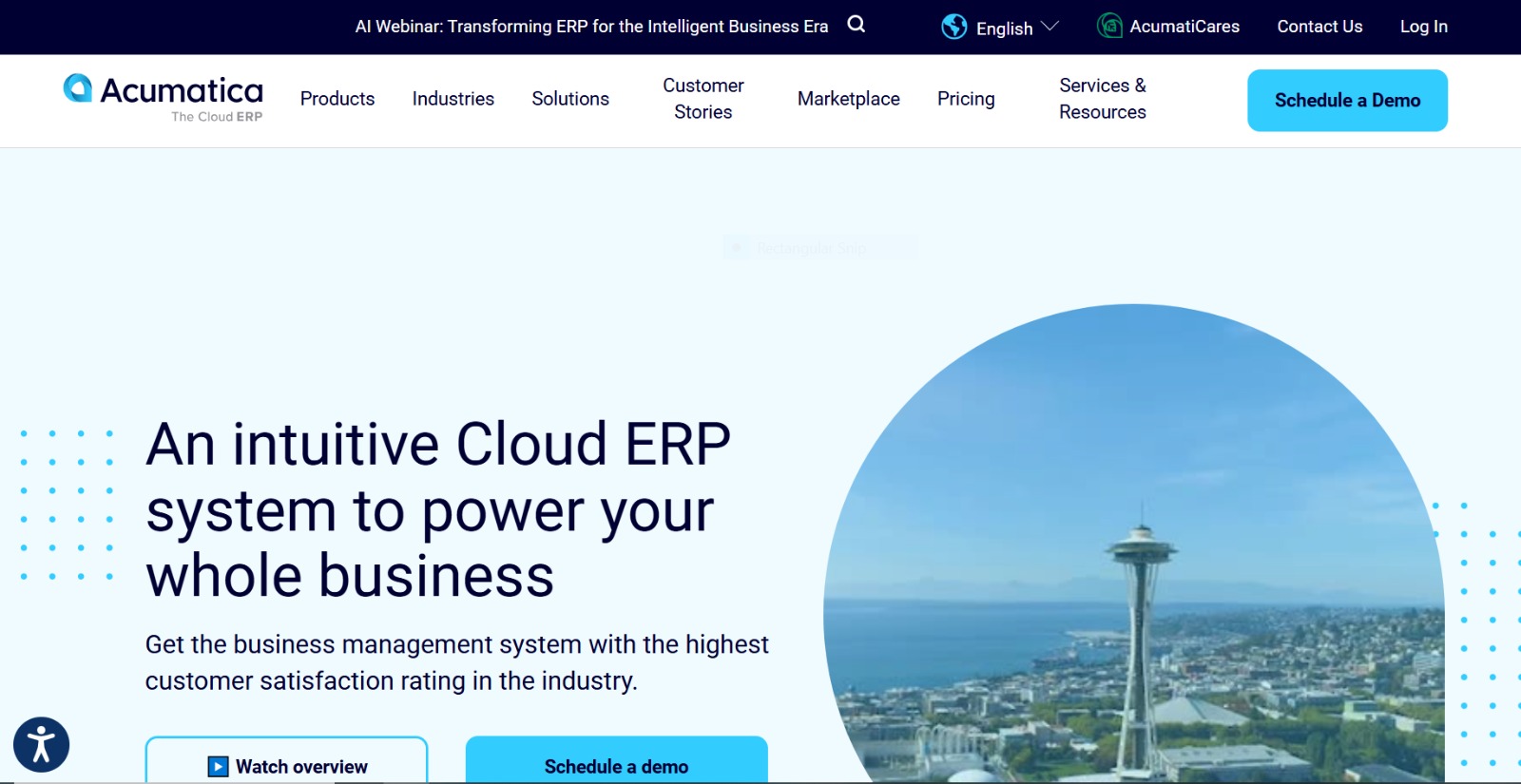
Acumatica is a modern, cloud-based ERP solution designed for small to mid-sized businesses that need flexibility, scalability, and industry-specific functionality. Known for its open architecture and user-friendly interface, Acumatica provides real-time insights across financials, inventory, project management, CRM, and more.
One of Acumatica’s standout features is its flexible pricing model—based on resources used rather than per-user licensing. This makes it a cost-effective option for growing businesses with expanding teams and departments.
Key Features:
- Financial Management: Streamlines accounting, cash management, budgeting, and tax compliance.
- Inventory & Order Management: Provides real-time tracking, automated replenishment, and warehouse integration.
- Project Accounting: Tracks project costs, time, and billing for service-based industries.
- Customer Management (CRM): Integrated tools for sales, customer support, and marketing automation.
- Industry Editions: Specialized modules for manufacturing, construction, distribution, and retail.
- Cloud and Mobile Access: Access your ERP system from anywhere with full mobile functionality.
Benefits:
- Resource-based pricing allows unlimited user access
- Highly customizable to fit unique business processes
- Quick implementation with industry-specific templates
- Scales easily with growing businesses
- Open API architecture supports third-party integrations
Use Case:
Ideal for small to mid-sized companies in industries like manufacturing, distribution, and construction that require flexibility, cost control, and industry-focused features in a cloud ERP environment.
3- Sage Intacct
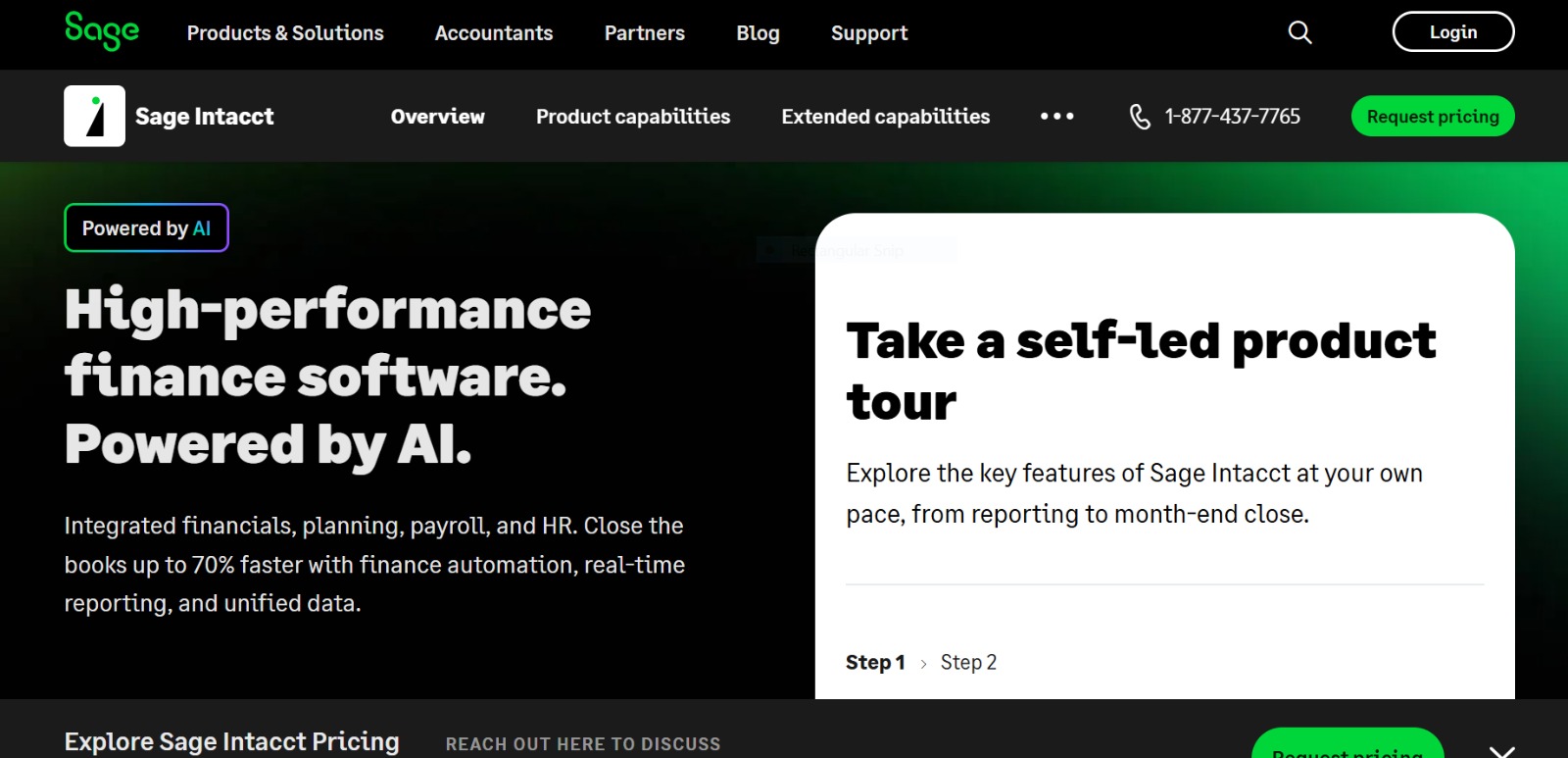
Sage Intacct is a powerful, cloud-native ERP system focused primarily on financial management and accounting. It is widely adopted by finance teams in small to mid-sized businesses, especially those in professional services, nonprofits, healthcare, and SaaS industries. Built for the cloud from the ground up, Sage Intacct delivers real-time financial insights, automation, and multi-entity support.
What makes Sage Intacct stand out is its strong financial core, AICPA endorsement, and deep capabilities in areas like revenue recognition, expense management, and audit tracking.
Key Features:
- Core Financials: Automates general ledger, accounts payable/receivable, cash management, and consolidations.
- Multi-Entity Management: Easily handles intercompany transactions, consolidations, and reporting.
- Revenue Recognition: Compliant with ASC 606 for subscription-based and recurring revenue models.
- Budgeting and Planning: Collaborative planning tools with real-time forecasting.
- Project Accounting: Tracks expenses, profitability, and resource usage by project.
- Dashboards & Reporting: Real-time dashboards and advanced analytics tailored to roles.
Benefits:
- Strong accounting and financial reporting capabilities
- Designed specifically for CFOs and finance teams
- Scales well for growing and multi-entity organizations
- Built-in compliance with financial standards
- Easy integration with Salesforce, ADP, and other platforms
Use Case:
Best suited for finance-driven organizations that need advanced accounting, compliance, and multi-entity management—especially in services, nonprofits, and subscription-based businesses.
4- IFS
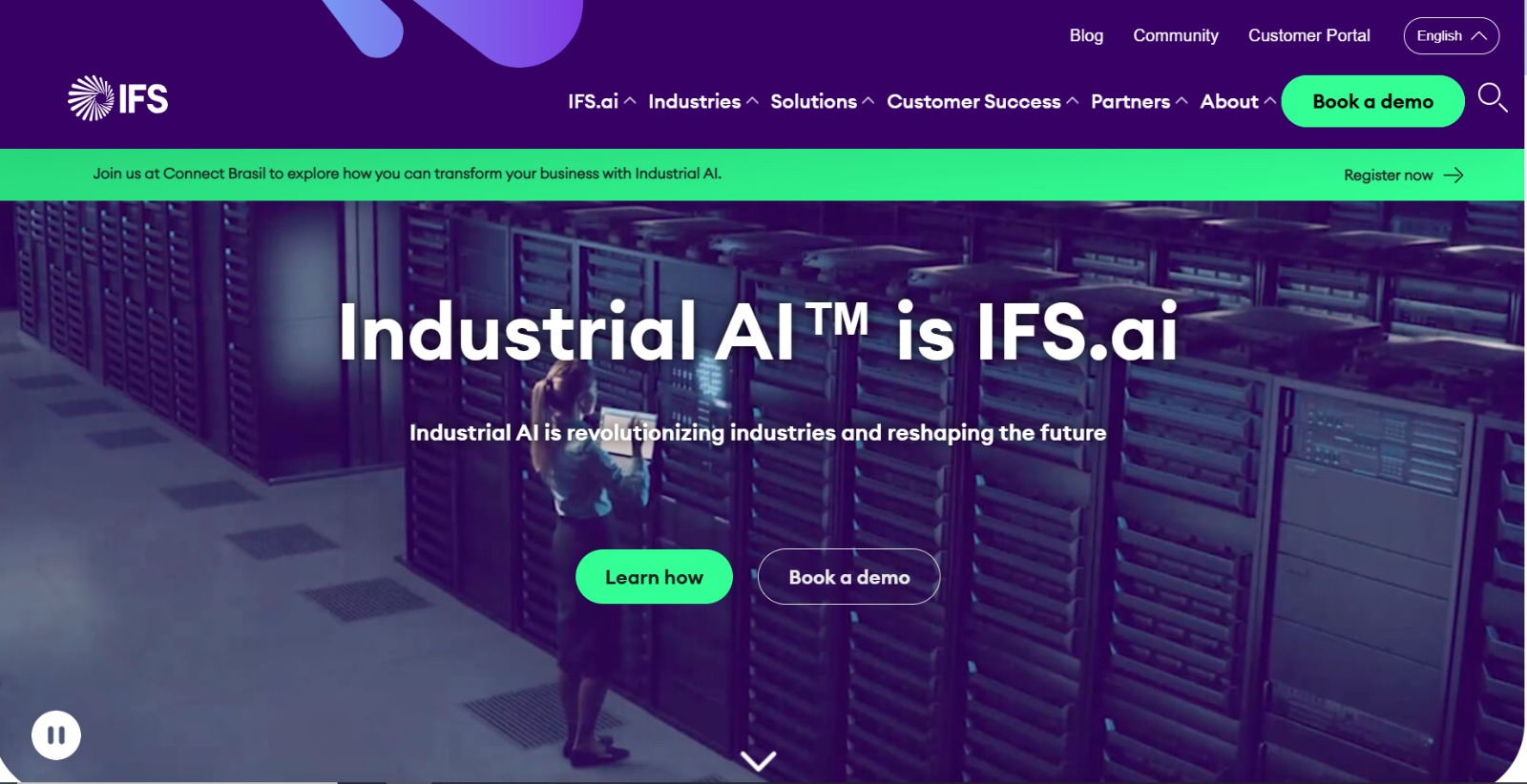
IFS is an enterprise-grade ERP solution known for its strength in managing complex operations like asset management, field service, manufacturing, and project-based industries. With a focus on industries like aerospace, defense, construction, and energy, IFS provides deep functionality tailored to mission-critical processes.
IFS Cloud is the platform’s latest iteration, offering AI-driven insights, end-to-end automation, and industry-specific capabilities—all in a modern, flexible cloud architecture.
Key Features:
- Enterprise Asset Management (EAM): Tracks lifecycle of equipment, maintenance, and uptime.
- Field Service Management: Real-time scheduling, dispatch, and mobile technician tools.
- Manufacturing Operations: Supports discrete, process, and mixed-mode manufacturing.
- Project Management: Manages costs, resources, timelines, and progress tracking.
- AI & Automation: Embedded AI to predict issues and optimize decision-making.
- Cloud or On-Premise: Flexible deployment options for regulated industries.
Benefits:
- Deep industry-specific functionality for complex environments
- Strong integration of service, project, and asset management
- Scalable and modular platform built for global enterprises
- User-friendly interface with customizable dashboards
- Focus on uptime, compliance, and predictive analytics
Use Case:
Ideal for large organizations in asset-intensive or service-centric industries such as manufacturing, aerospace, utilities, and engineering that need precise control over operations and assets.
5- Epicor (including Kinetic)
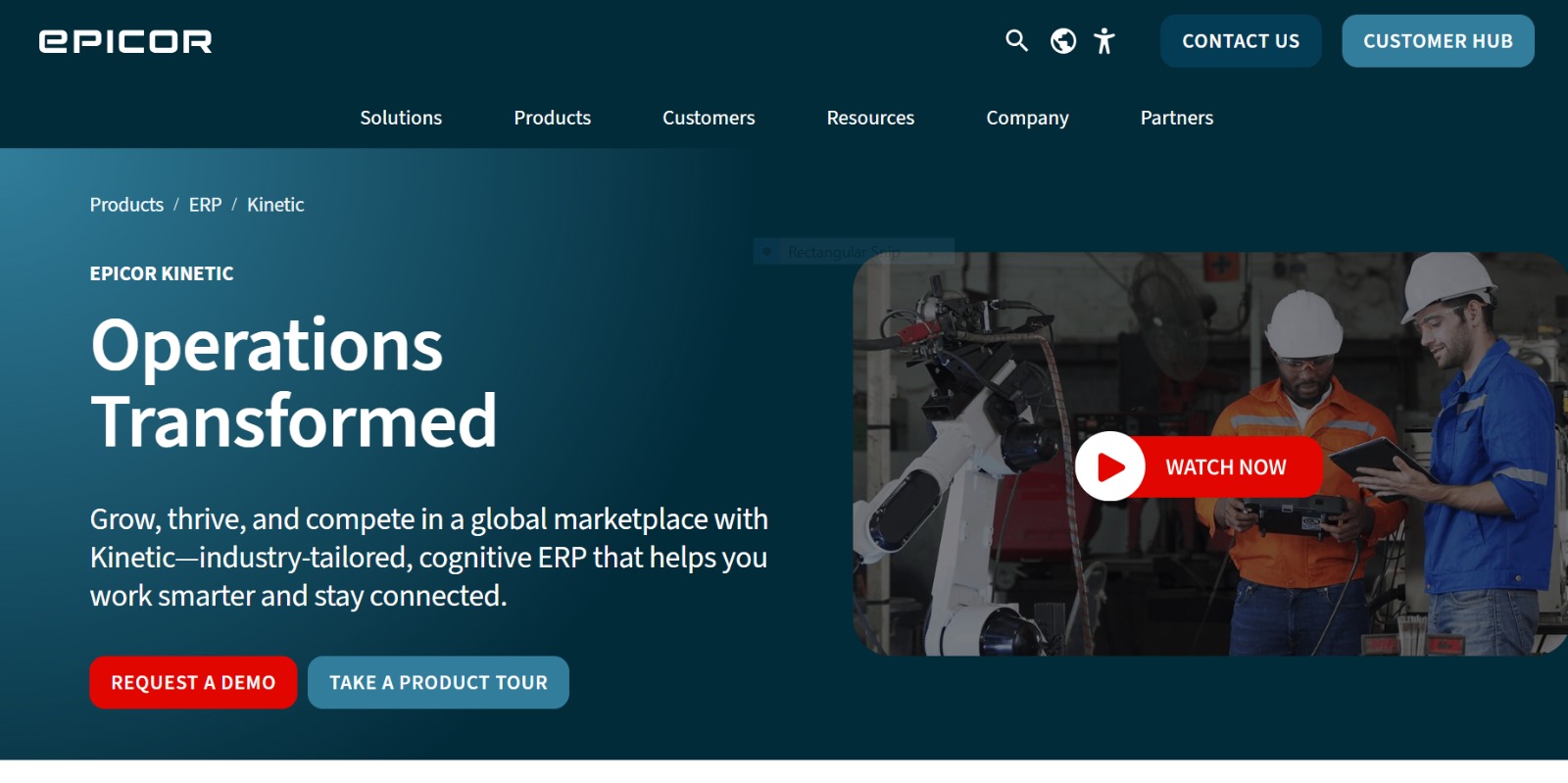
Epicor is a long-standing ERP provider tailored to manufacturing, distribution, retail, and services industries. Its latest cloud-based version, Epicor Kinetic, brings a modern, intuitive interface and powerful low-code customization tools, making it a top choice for manufacturers looking for digital transformation.
Epicor stands out for its deep industry knowledge and end-to-end supply chain and production management capabilities. Whether deployed on-premise or in the cloud, it supports businesses aiming to streamline operations, improve productivity, and respond faster to market changes.
Key Features:
- Production Management: Advanced planning, scheduling, and shop floor control tools.
- Supply Chain Management: Real-time inventory tracking, logistics, and supplier collaboration.
- Financial Management: Multi-company, multi-currency accounting with real-time reporting.
- Customer Relationship Management (CRM): Integrated sales and customer service functionality.
- Kinetic Design Framework: Low-code environment to customize workflows and user experiences.
- Analytics & BI: Interactive dashboards and built-in analytics for better decision-making.
Benefits:
- Built specifically for manufacturers and distributors
- Highly customizable with user-friendly design tools
- Strong support for make-to-order and engineer-to-order models
- Scalable for small shops to large global manufacturers
- Flexible deployment options (cloud, hybrid, on-premise)
Use Case:
Ideal for manufacturing and distribution companies needing a flexible, modern ERP platform that adapts to their processes and supports innovation, especially in industries like automotive, aerospace, electronics, and industrial machinery.
6- Microsoft Dynamics 365
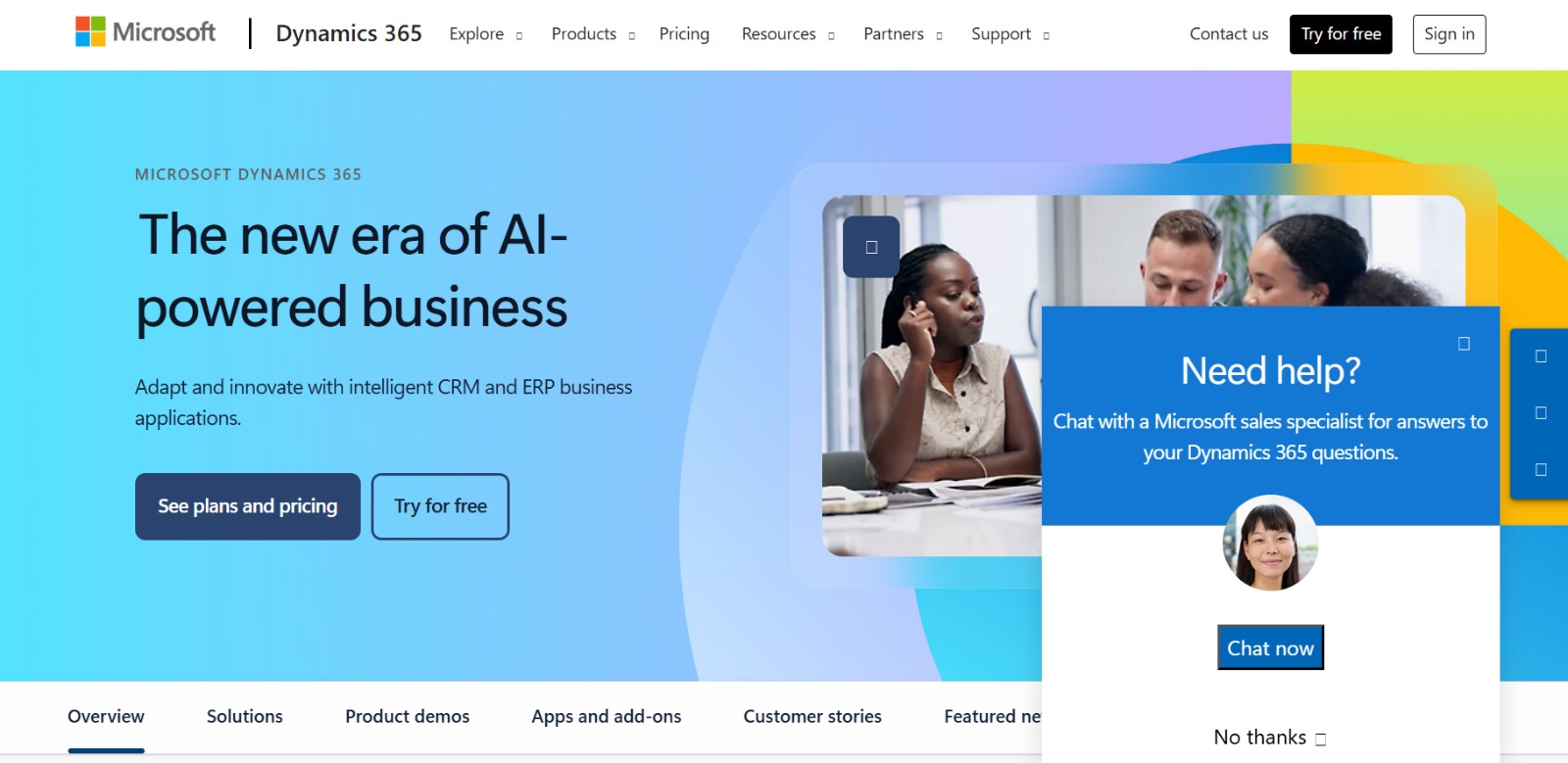
Microsoft Dynamics 365 is a leading cloud-based ERP and CRM solution designed to unify operations, sales, finance, and customer service under one integrated platform. Powered by Microsoft Azure and fully integrated with Microsoft 365 (formerly Office), Dynamics 365 is highly scalable and customizable—making it suitable for businesses of all sizes across industries.
What makes Dynamics 365 powerful is its modular architecture. Companies can start with the apps they need—such as Finance, Supply Chain Management, or Sales—and add more as they grow. The platform also offers strong AI, business intelligence, and automation tools through Microsoft Power Platform.
Key Features:
- Finance & Operations: Real-time visibility into financials, budgeting, and compliance.
- Supply Chain Management: Enhances inventory visibility, warehouse management, and procurement.
- Sales & CRM: Tracks customer journeys, pipeline performance, and account engagement.
- Customer Service: Tools for case management, omni-channel support, and self-service portals.
- Power Platform Integration: Automate workflows, build apps, and create dashboards using Power BI, Power Apps, and Power Automate.
- Microsoft Ecosystem: Seamless integration with Teams, Excel, Outlook, SharePoint, and Azure.
Benefits:
- Unified platform for ERP and CRM functionality
- Highly customizable with low-code/no-code tools
- Strong reporting, automation, and AI capabilities
- Scalable for startups to large enterprises
- Backed by Microsoft’s global infrastructure and security
Use Case:
Best for organizations looking for a complete, cloud-based business platform that integrates deeply with Microsoft tools and provides flexibility to support a wide range of departments and industries—from retail and finance to manufacturing and services.
7- Microsoft Dynamics 365 Business Central (formerly NAV)
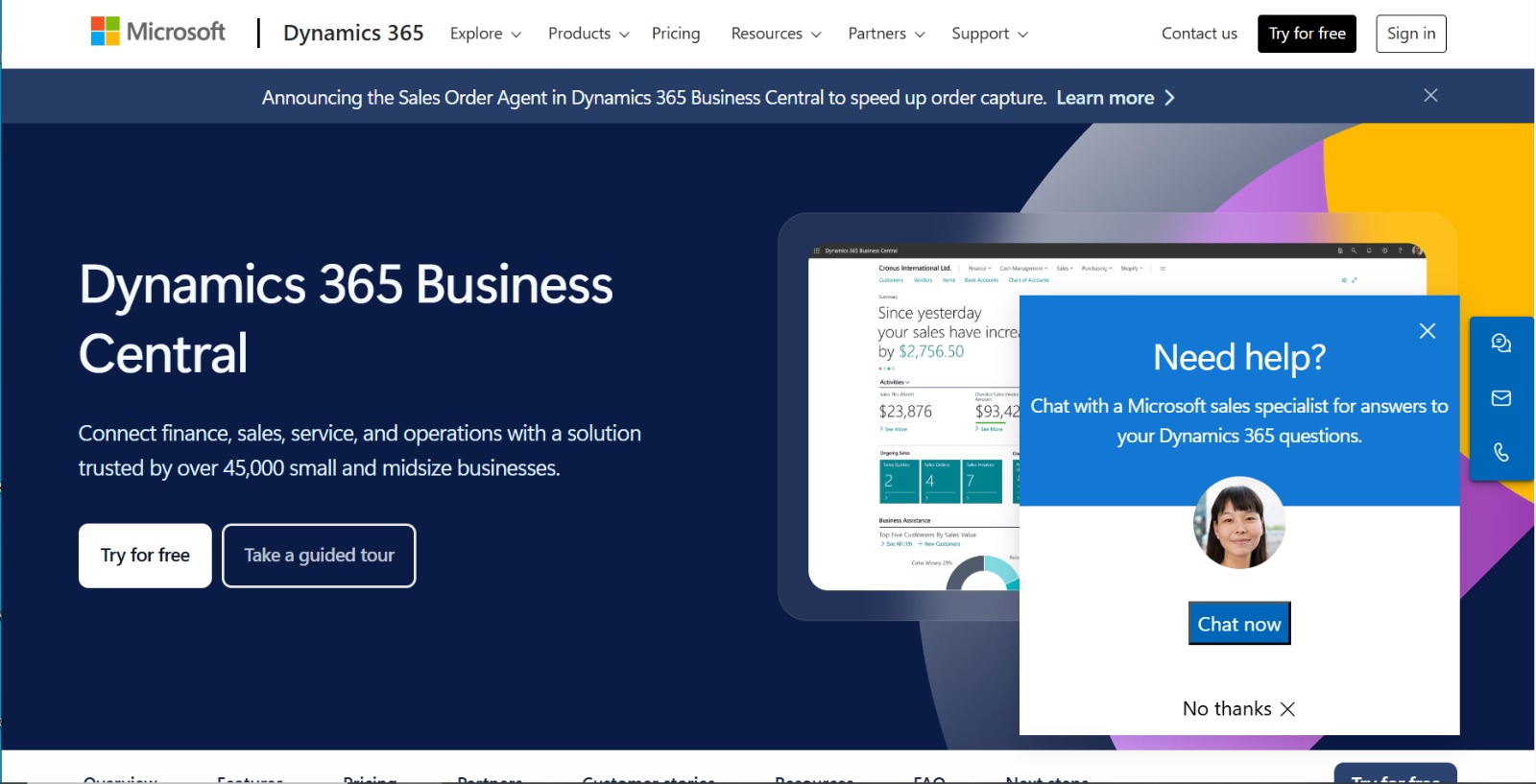
Microsoft Dynamics 365 Business Central, previously known as Navision (NAV), is a comprehensive ERP solution tailored for small to mid-sized businesses looking for an affordable, flexible system to manage their entire business. It delivers robust functionality across finance, sales, purchasing, inventory, project management, and service operations—all within a unified cloud-based platform.
Built on the Microsoft ecosystem, Business Central is known for its ease of use, seamless integration with Microsoft 365 apps like Excel and Outlook, and rapid deployment. It’s a favorite among growing companies that want enterprise-level capabilities without the complexity of larger ERP systems.
Key Features:
- Financial Management: Automates general ledger, budgeting, cash flow, and bank reconciliation.
- Inventory & Supply Chain: Real-time control over purchasing, warehousing, and inventory.
- Sales & Service Management: Manages customer interactions, sales orders, and service contracts.
- Project Management: Tracks budgets, time sheets, and project profitability.
- Manufacturing Support: Basic planning, production orders, and capacity management.
- Integration & Extensibility: Built-in integration with Power BI, Power Apps, and Microsoft Teams.
Benefits:
- Ideal for SMBs transitioning from spreadsheets or entry-level accounting software
- Familiar Microsoft interface for easy adoption
- Modular and scalable as your business grows
- Strong community and partner ecosystem
- Cloud and on-premise deployment options
Use Case:
Perfect for small and mid-sized businesses across industries—such as wholesale, retail, services, and light manufacturing—that need a robust, easy-to-use ERP solution with seamless Microsoft integration and room to grow.
8- Odoo
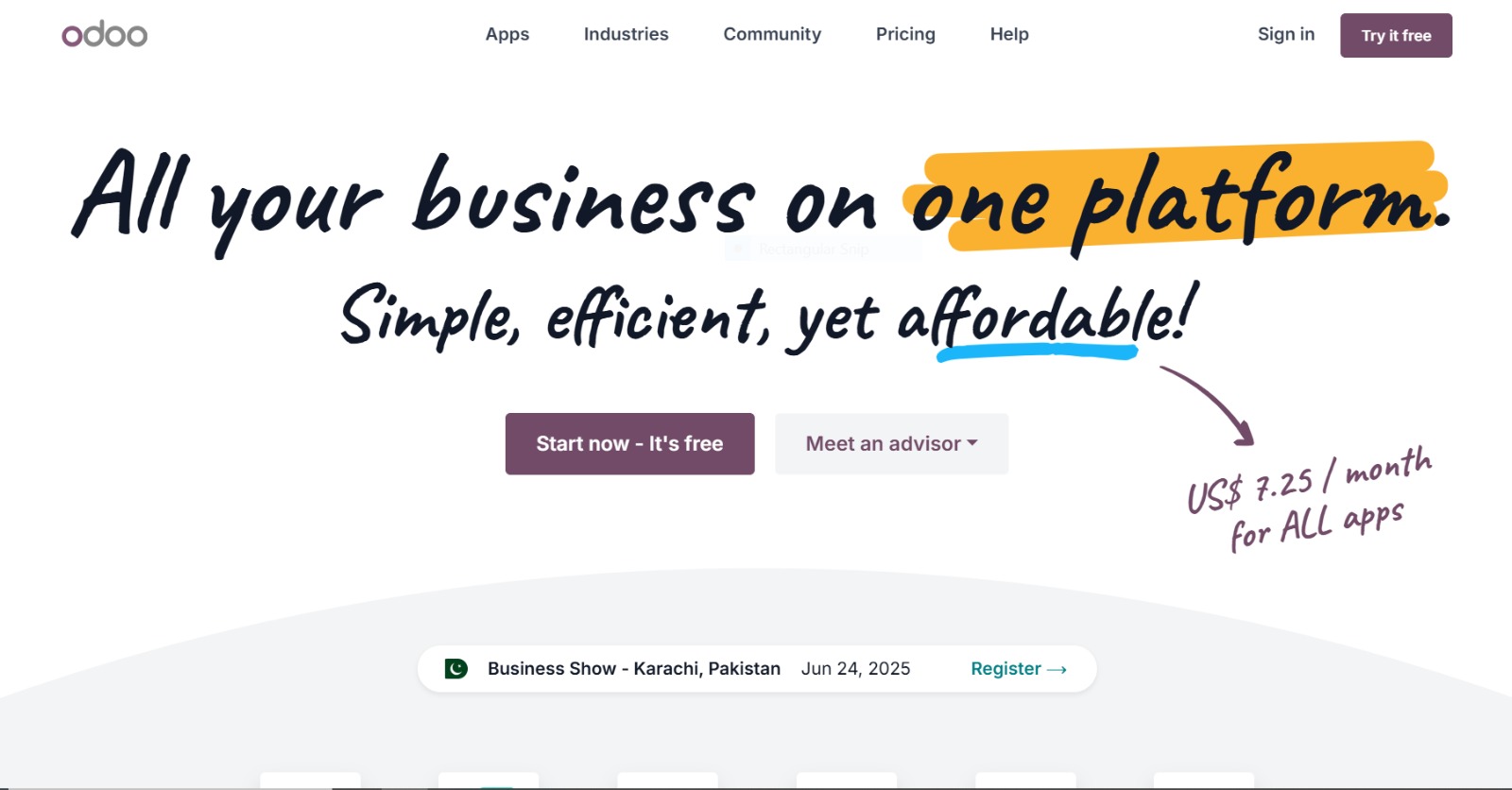
Odoo is a highly flexible and open-source ERP platform designed for businesses of all sizes, especially small to mid-sized companies seeking a modular and cost-effective solution. With over 60 integrated business apps—including modules for accounting, CRM, inventory, HR, eCommerce, and manufacturing—Odoo lets companies build a custom ERP system tailored to their needs.
Its open-source nature makes it one of the most customizable ERPs on the market, allowing businesses to adapt workflows, design user interfaces, and add features as required. Odoo offers both free (Community) and paid (Enterprise) editions, making it accessible to a wide range of organizations.
Key Features:
- Modular Architecture: Choose only the apps you need—from accounting to eCommerce to helpdesk.
- Inventory & MRP: Real-time tracking of stock, orders, and manufacturing operations.
- Sales & CRM: End-to-end sales pipeline management with integrated customer insights.
- Finance & Accounting: Automates invoicing, expenses, taxes, and bank reconciliation.
- HR & Payroll: Manage recruitment, attendance, appraisals, and employee records.
- eCommerce & Website Builder: Create and manage online stores directly within Odoo.
Benefits:
- Open-source and fully customizable
- Cost-effective, with a free community version
- Integrated apps reduce the need for third-party software
- Strong support for localization and multi-language use
- Active community and growing app marketplace
Use Case:
Ideal for startups, SMEs, and tech-savvy organizations looking for a highly adaptable ERP that can grow with their needs. Odoo is especially attractive to companies with in-house development teams or those seeking a balance between affordability and functionality.
9- SAP S/4HANA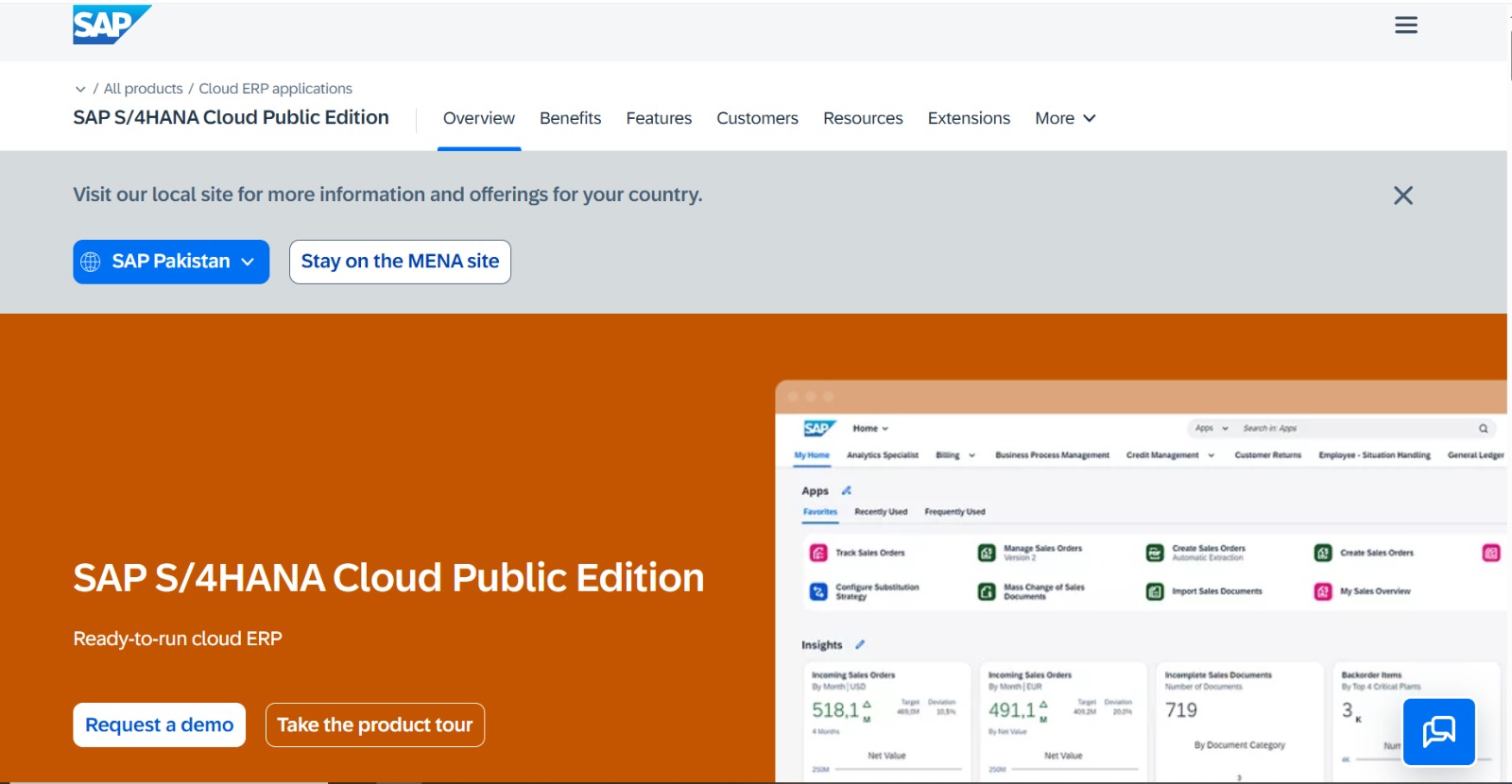
SAP S/4HANA is SAP’s next-generation, enterprise-grade ERP suite designed for large organizations that require real-time operations, global scalability, and deep industry-specific functionality. Built on the SAP HANA in-memory database, it delivers lightning-fast analytics and simplified data models, enabling faster decision-making and streamlined business processes.
SAP S/4HANA supports both cloud and on-premise deployments and is used by major enterprises across manufacturing, retail, finance, public sector, and more. It’s especially powerful for companies needing full integration across finance, supply chain, procurement, and production.
Key Features:
- In-Memory Processing: Real-time analytics, forecasting, and data-driven decision-making.
- Financial Management: Comprehensive tools for financial planning, accounting, and consolidation.
- Supply Chain & Manufacturing: Tracks demand, inventory, logistics, and production planning.
- Procurement & Sourcing: Automates vendor management and purchase workflows.
- Industry-Specific Modules: Tailored solutions for sectors like automotive, healthcare, and utilities.
- AI & Automation: Embedded intelligence for predictive analytics and process automation.
Benefits:
- Best-in-class performance with real-time data access
- Global scalability and multilingual, multi-currency support
- Deep vertical-specific capabilities
- Integrated platform for all business units
- Backed by SAP’s global ecosystem and support
Use Case:
Best suited for large, global enterprises operating in complex or regulated industries that need real-time operational visibility, industry customization, and powerful analytics.
10- Infor CloudSuite Industrial (formerly SyteLine)
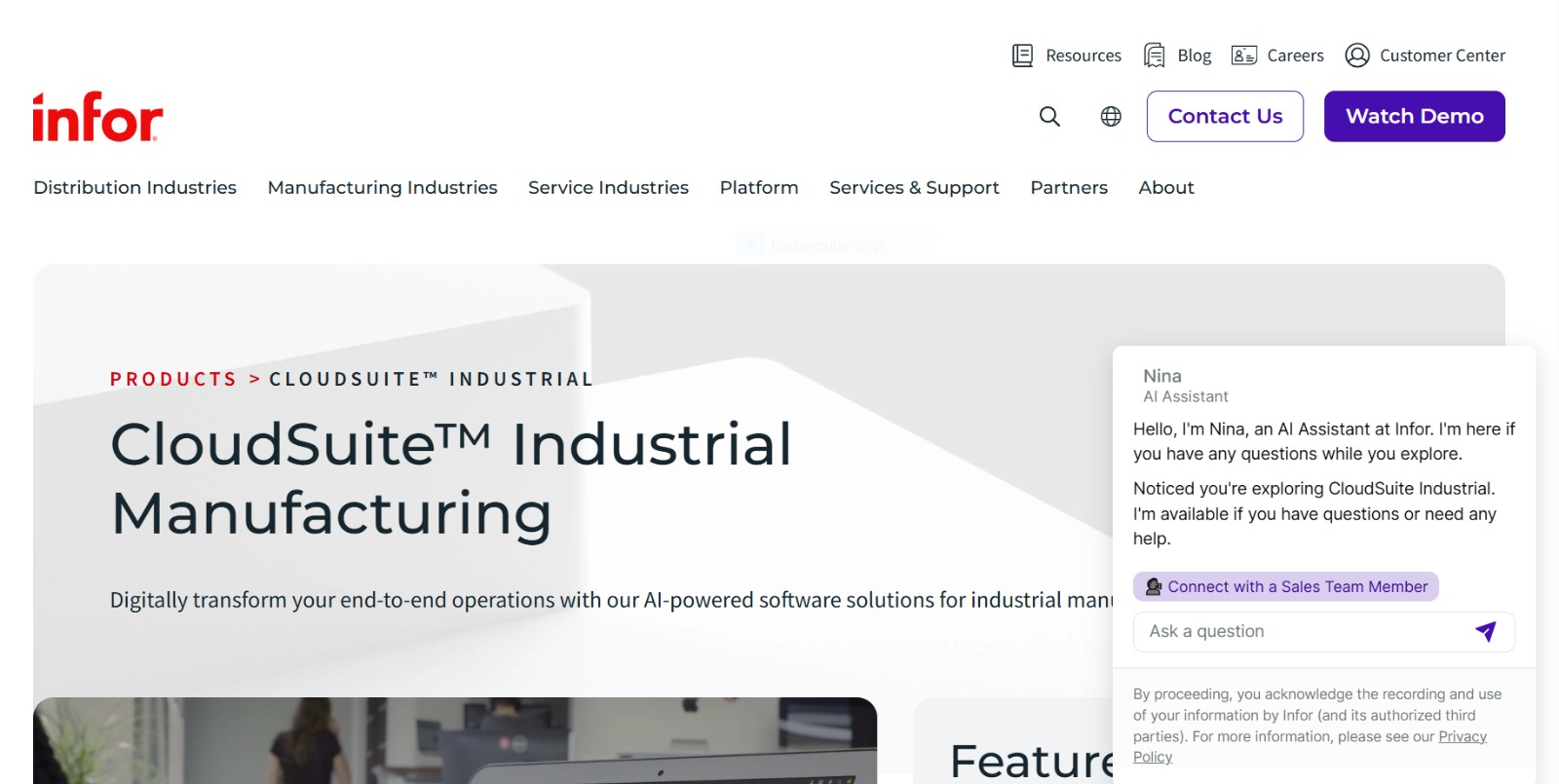
Infor CloudSuite Industrial is a robust cloud ERP solution designed specifically for manufacturing and distribution companies. Formerly known as SyteLine, this platform supports discrete and process manufacturers with powerful tools for production planning, quality control, inventory management, and customer engagement.
With deep industry-specific features and built-in business intelligence, Infor CloudSuite Industrial helps manufacturers streamline operations, reduce costs, and deliver products on time. Its flexible deployment options and scalable architecture make it a go-to choice for growing manufacturers.
Key Features:
- Advanced Planning & Scheduling (APS): Real-time visibility into capacity, materials, and shop floor status.
- Manufacturing Operations: Supports mixed-mode production, job costing, and work orders.
- Supply Chain Management: Integrated purchasing, logistics, and inventory control.
- Quality Management: Built-in tools for inspections, compliance, and traceability.
- Customer & Order Management: Manages quotes, orders, contracts, and after-sales support.
- Extensibility & Integration: Easily integrates with Infor OS, analytics, and external tools.
Benefits:
- Built for manufacturers with deep industry functionality
- Strong production planning and scheduling capabilities
- Cloud-based with multi-tenant or single-tenant options
- Real-time analytics and role-based dashboards
- Scales well for growing industrial businesses
Use Case:
Ideal for manufacturers and distributors—particularly in automotive, aerospace, industrial equipment, and high-tech sectors—who need a comprehensive and flexible ERP to manage complex shop floor and supply chain operations.
11- SYSPRO
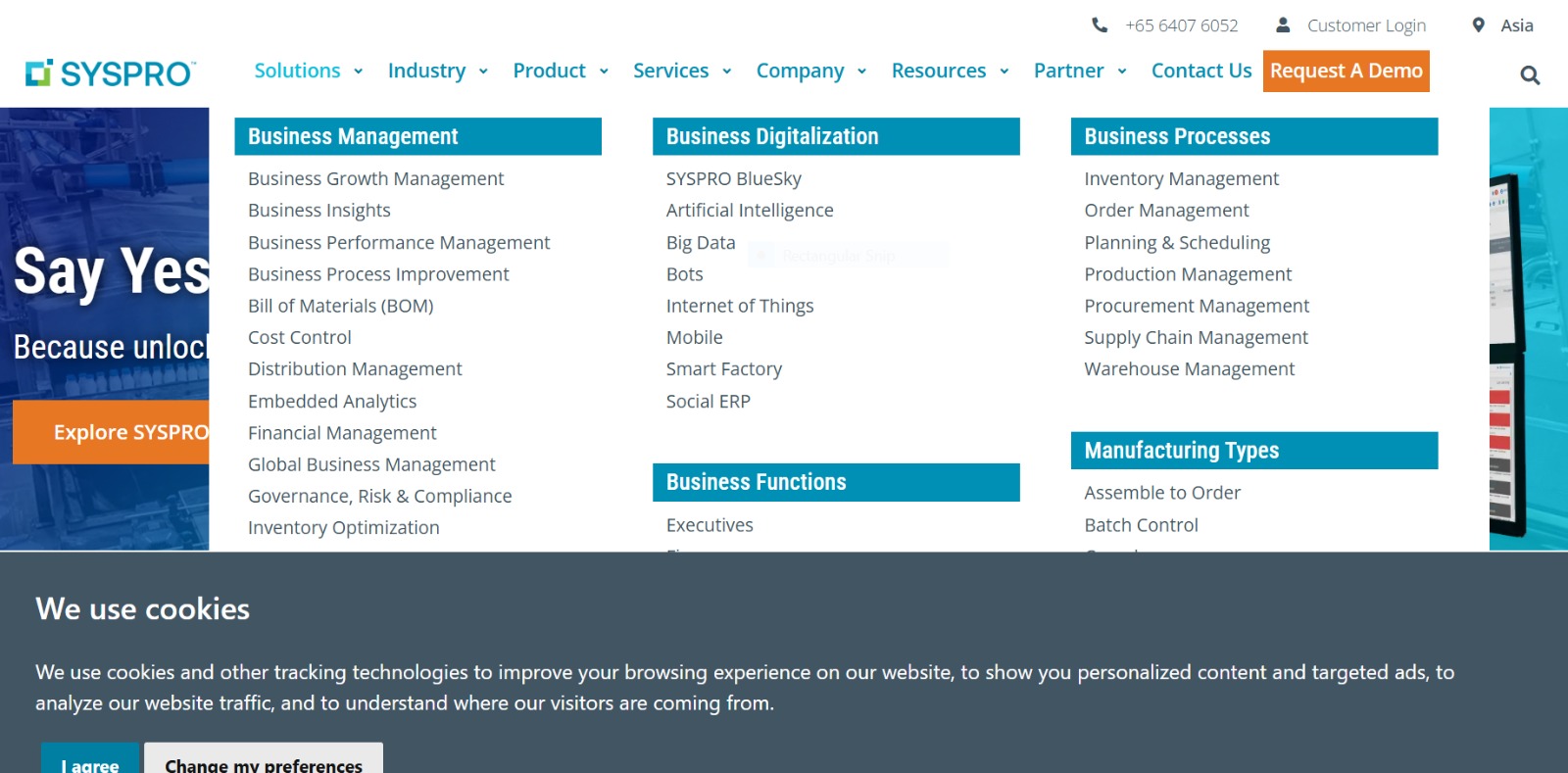
SYSPRO is a specialized ERP platform built primarily for manufacturers and distributors, offering end-to-end visibility and control over core business processes. Known for its industry focus, SYSPRO delivers robust features for inventory, production, procurement, and financial management, all within a highly configurable system.
SYSPRO supports both on-premise and cloud deployments and is especially popular among mid-sized businesses looking for flexibility without sacrificing depth. Its modular structure allows companies to scale the solution as they grow, while maintaining tight control over operations and compliance.
Key Features:
- Manufacturing Management: Supports discrete, batch, and process manufacturing models.
- Inventory Control: Real-time inventory tracking, stock optimization, and warehouse management.
- Financials: General ledger, accounts payable/receivable, cash management, and financial reporting.
- Supply Chain Integration: Procurement, order management, and logistics coordination.
- Customization Tools: Low-code/no-code personalization for dashboards and workflows.
- Analytics & Reporting: Built-in business intelligence with role-based insights.
Benefits:
- Strong fit for manufacturing and distribution industries
- Highly customizable and scalable ERP solution
- Flexible deployment: cloud, on-premise, or hybrid
- Strong data security and governance capabilities
- User-friendly interface designed for non-technical users
Use Case:
Best for mid-sized manufacturers and distributors that need industry-specific functionality, flexible deployment options, and control over complex operations—from shop floor to finance.
12- Oracle ERP Cloud
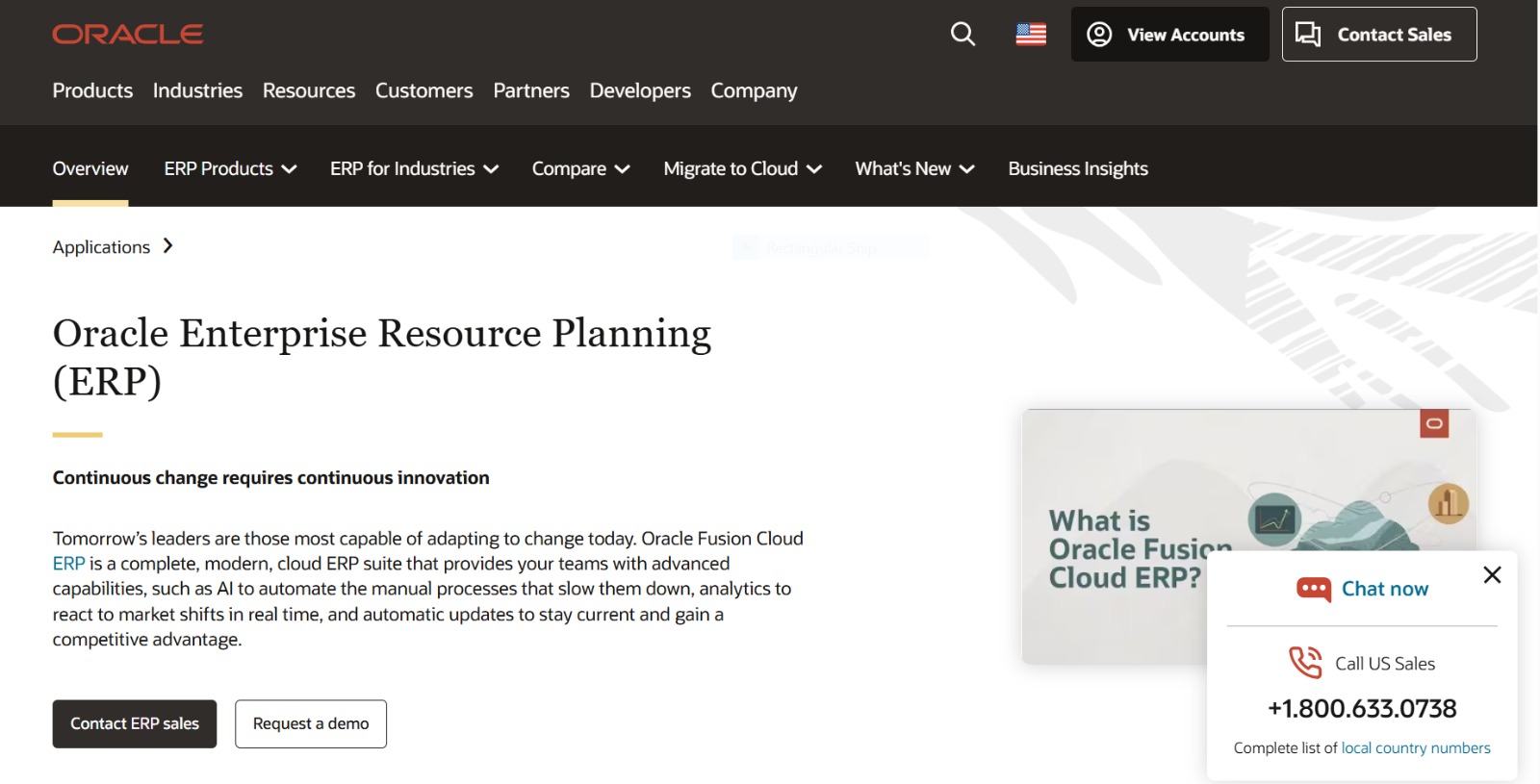
Oracle ERP Cloud is a comprehensive, enterprise-grade cloud ERP platform designed for large and mid-sized organizations that need powerful financial management, procurement, project management, and risk compliance tools. Built on Oracle’s advanced cloud infrastructure, it delivers scalability, security, and real-time insights to help businesses drive performance and innovation.
Oracle ERP Cloud is known for its strong financial suite and AI-driven automation, making it ideal for organizations with complex finance and compliance requirements. It is also part of Oracle Fusion Cloud Applications, which allows seamless integration across supply chain, HR, and customer experience.
Key Features:
- Financial Management: Comprehensive tools for general ledger, AP/AR, cash flow, and budgeting.
- Procurement: End-to-end supplier management, sourcing, and contract management.
- Project Portfolio Management: Track project budgets, resources, and profitability in real time.
- Risk Management & Compliance: Automates audits, risk analysis, and regulatory compliance.
- AI & Analytics: Embedded intelligence for forecasting, automation, and anomaly detection.
- Global Capabilities: Supports multiple languages, currencies, and localizations.
Benefits:
- Trusted by global enterprises for financial and operational control
- Powerful automation and predictive analytics tools
- High scalability and real-time performance
- Tight security and compliance controls
- Modular and extensible with Oracle Cloud ecosystem
Use Case:
Ideal for large enterprises and growing mid-sized companies with complex financial operations, multinational presence, and a strong focus on governance, compliance, and innovation through AI and automation.
13- Infor
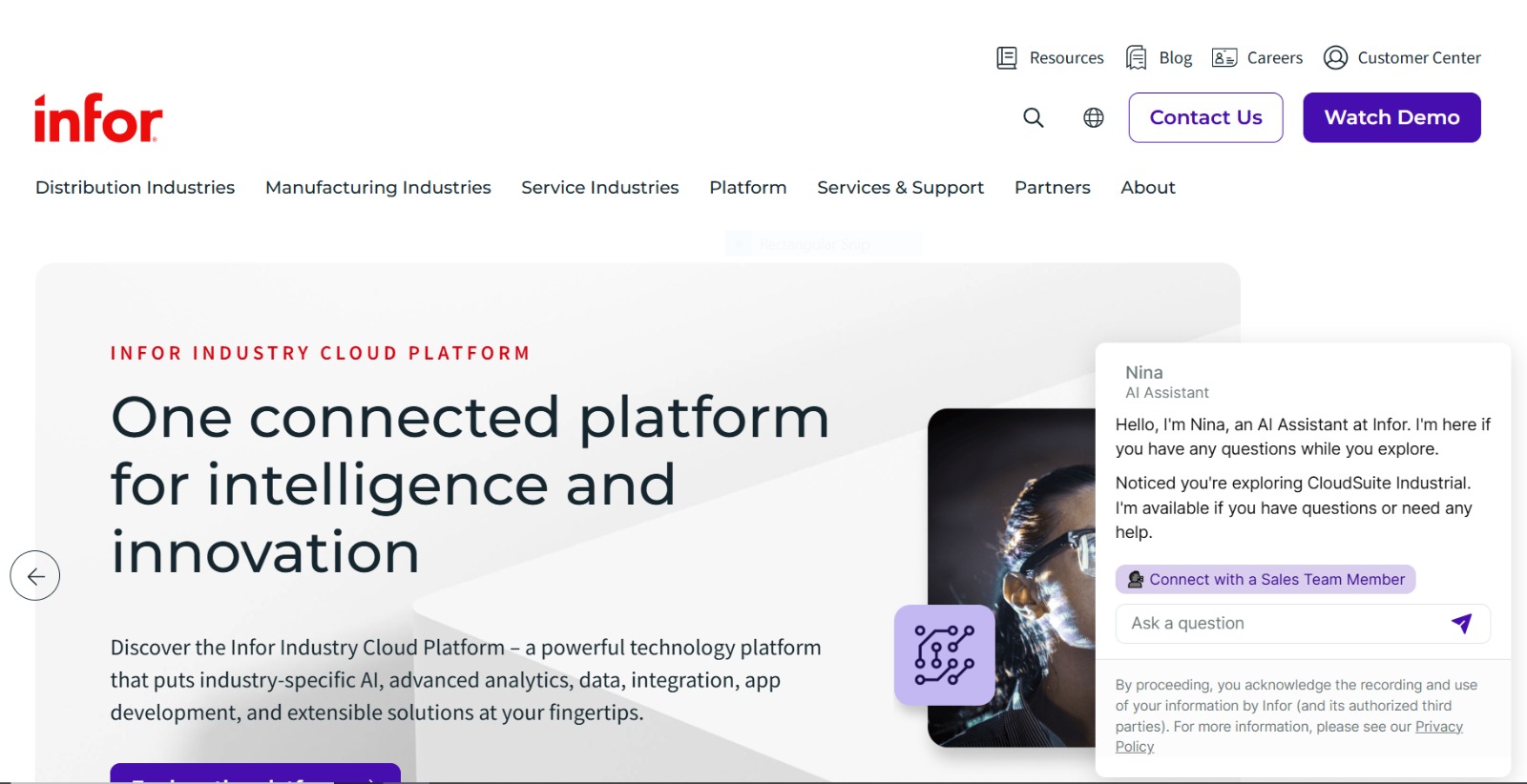
Infor ERP is a cloud-based enterprise resource planning solution designed for a wide range of industries, including manufacturing, healthcare, retail, and distribution. Built on the powerful Infor OS (Operating Service) platform and hosted on AWS, Infor offers deep industry-specific functionality, flexible deployment options, and modern user experiences.
Infor is known for its industry-first approach. Instead of offering a one-size-fits-all ERP, it delivers tailored solutions like Infor LN (for complex manufacturing), Infor M3 (for chemicals, fashion, and food), and Infor CloudSuite Industrial (discussed earlier), enabling businesses to implement faster and operate more efficiently.
Key Features:
- Industry-Specific Suites: Preconfigured workflows and analytics for over a dozen sectors.
- Cloud Deployment: Built on Amazon Web Services (AWS) for security, speed, and scalability.
- Financial & Supply Chain Management: Real-time visibility into procurement, inventory, and financials.
- Human Capital Management (HCM): Tools for talent acquisition, onboarding, and employee development.
- Data & Analytics: Advanced reporting, dashboards, and AI-driven decision support.
- Modern UX: Intuitive interface with mobile and web access for better usability.
Benefits:
- Strong vertical specialization reduces need for customizations
- Cloud-first with robust security and performance
- AI and machine learning integrations for predictive insights
- Flexible modules to fit specific business needs
- Scalable for medium to large enterprises
Use Case:
Best for companies seeking an ERP tailored to their industry, especially in manufacturing, healthcare, and distribution, with modern cloud capabilities and the flexibility to grow and evolve.
14- SAP ECC (ERP Central Component)
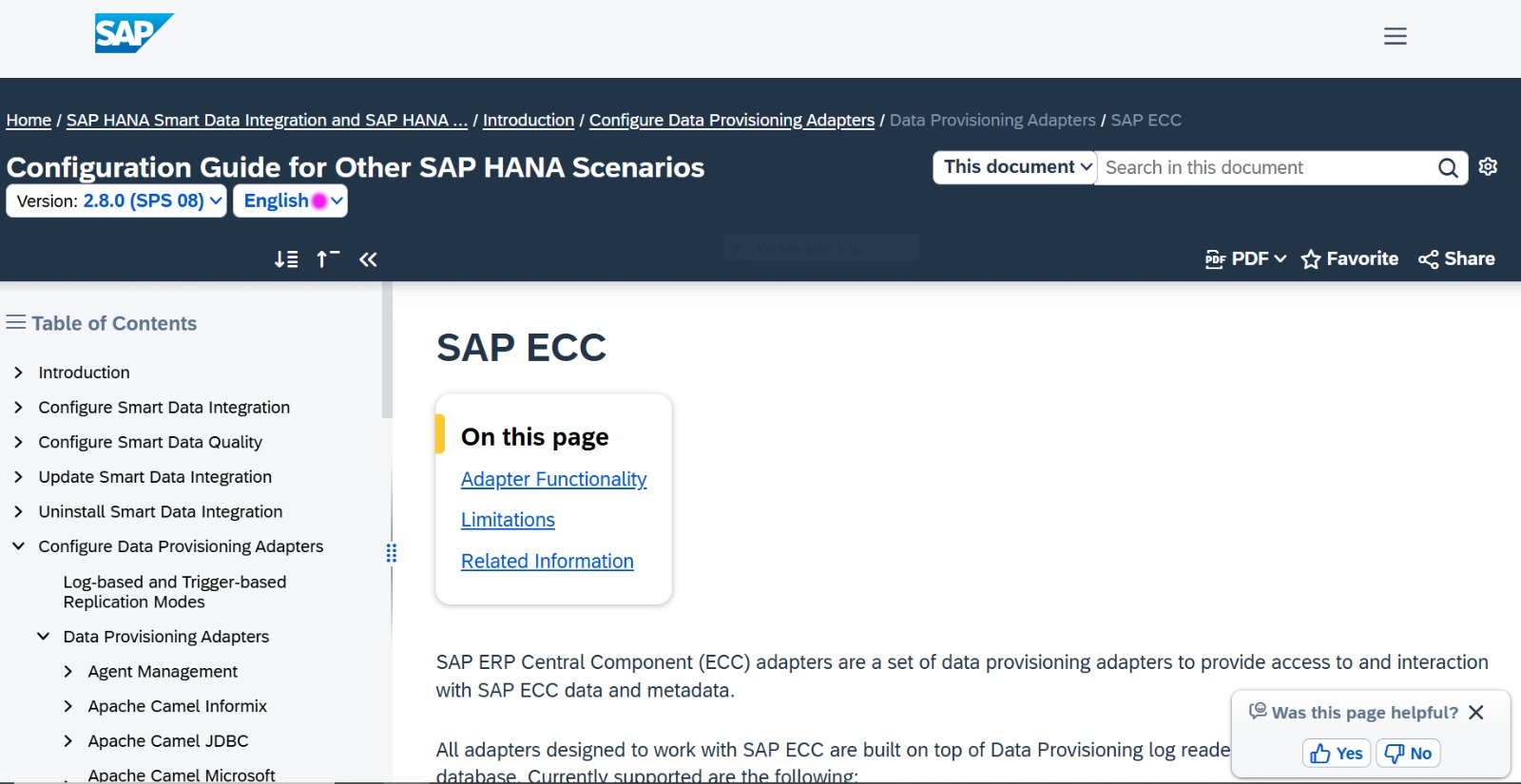
SAP ECC (ERP Central Component) is SAP’s legacy on-premise ERP system, widely used by large enterprises across the globe. It has been the backbone of many multinational companies for decades, offering robust, integrated modules covering finance, logistics, human resources, supply chain, and more.
Although SAP is transitioning customers toward its next-gen S/4HANA platform, ECC remains in active use, particularly in industries where stability, customization, and complex processes are deeply embedded in the system. Many companies continue to run SAP ECC while planning their eventual migration to S/4HANA.
Key Features:
- Comprehensive Modules: Covers finance (FI), controlling (CO), sales & distribution (SD), materials management (MM), production planning (PP), HR, and more.
- Highly Customizable: Supports complex business logic and unique industry workflows.
- Integration: Seamlessly connects with third-party systems, SAP BW, and SAP CRM.
- Multi-Currency & Localization: Suitable for global operations with support for local tax and legal requirements.
- Stable On-Premise Deployment: Offers full control over infrastructure and updates.
Benefits:
- Mature, proven solution trusted by global enterprises
- Highly configurable to match specific business needs
- Deep integration across business functions
- Long track record of performance and reliability
- Extensive partner and support ecosystem
Use Case:
Ideal for large enterprises already using SAP infrastructure that require a stable, deeply integrated ERP system and are not yet ready to transition to S/4HANA.
15- Workday or Deltek (Based on Industry Needs)
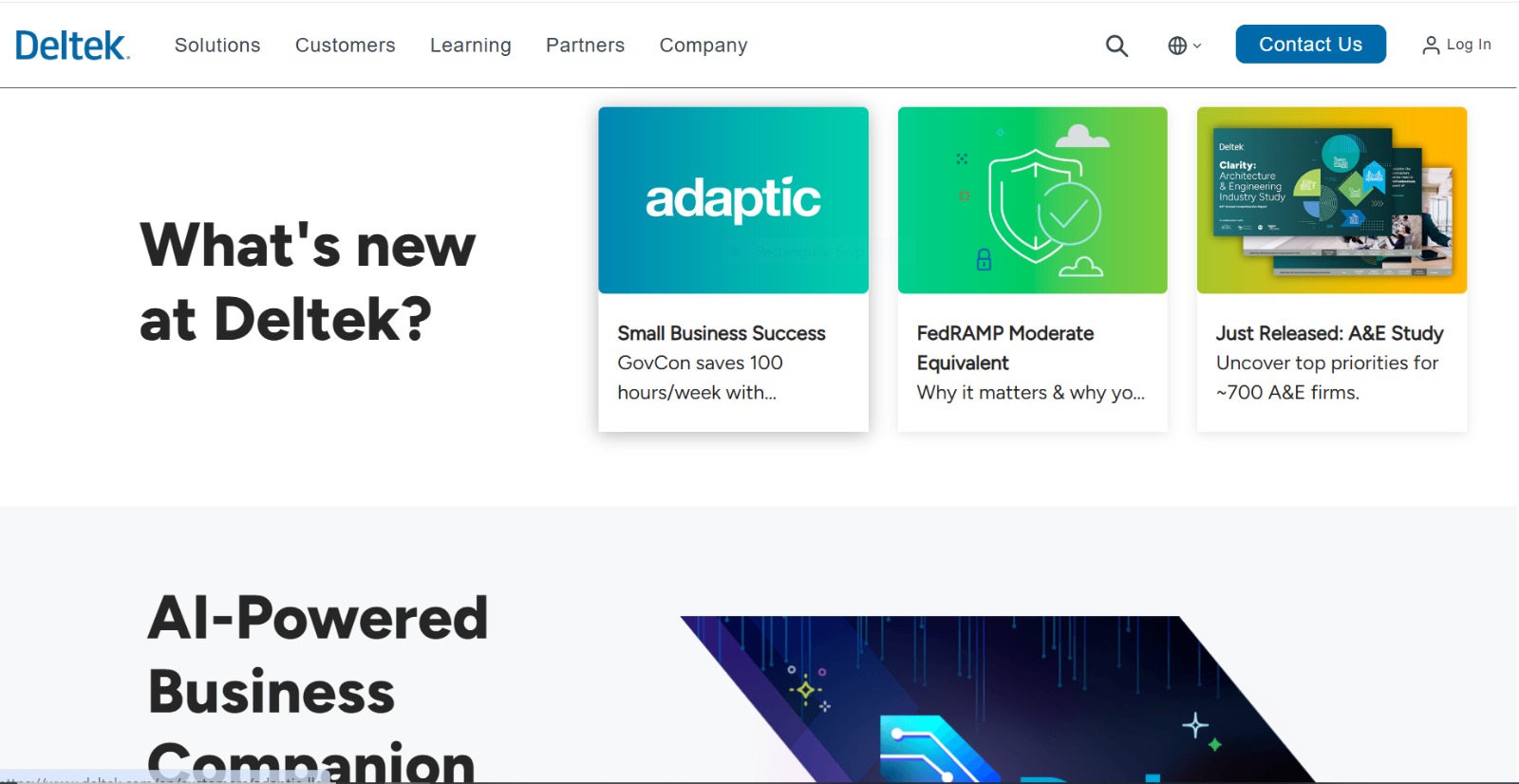
Workday and Deltek are two powerful ERP platforms, each designed for specific industries and business models. Your choice between them should depend on your company’s structure and operational focus.
Workday
Workday is a cloud-native ERP platform focused on human capital management (HCM) and financial management, making it especially popular among service-based industries like education, healthcare, tech, and government. Known for its intuitive user experience, real-time analytics, and built-in compliance tools, Workday empowers HR and finance teams to plan, recruit, manage, and analyze from a single platform.
Key Features:
- HCM: Talent acquisition, workforce planning, payroll, and employee engagement
- Financials: Budgeting, expense tracking, auditing, and financial reporting
- Real-Time Analytics: Embedded dashboards and predictive modeling
- Continuous Updates: Regular cloud updates without downtime
- Global Compliance: Built-in support for multiple countries and jurisdictions
Use Case:
Best for medium to large service-based companies prioritizing talent management, HR operations, and financial clarity.
Deltek
Deltek specializes in ERP solutions for project-based businesses, including government contractors, architecture & engineering firms, and professional services companies. With tools designed to manage project lifecycles, compliance, and billing, Deltek supports highly regulated and contract-driven industries.
Key Features:
- Project Management: Real-time tracking of budgets, timelines, and resources
- Time & Expense Tracking: Integrated tools for project-level cost control
- Government Compliance: Supports DCAA and other regulatory frameworks
- CRM & Proposal Automation: Tools for winning and managing projects
- Industry-Specific Editions: Built for consulting, construction, and government sectors
Use Case:
Ideal for project-based organizations needing precise project costing, regulatory compliance, and resource planning—particularly in the public sector or professional services.
Conclusion
Choosing the right ERP software is a critical decision that can significantly impact your business’s efficiency, scalability, and bottom line. The best ERP platforms in 2026—like NetSuite, SAP S/4HANA, Oracle ERP Cloud, Microsoft Dynamics 365, and others—offer specialized features tailored for different industries, business sizes, and deployment preferences.
Whether you’re a manufacturer needing robust supply chain and production tools, a service-based business focused on HR and finance, or a global company requiring real-time analytics and compliance support—there’s an ERP solution built for your unique needs.
Before making your choice, consider your industry requirements, company size, budget, and long-term goals. Evaluate each platform’s features, ease of use, integration capabilities, and scalability. With the right ERP in place, your organization can streamline operations, enhance decision-making, and position itself for sustainable growth in a competitive market.
Frequently Asked Questions (FAQs)
What is ERP software and why is it important?
ERP (Enterprise Resource Planning) software is a suite of integrated applications that help organizations manage core business processes—such as finance, HR, manufacturing, supply chain, and customer relationships—in one centralized system. It improves efficiency, accuracy, and decision-making.
How do I choose the right ERP for my business?
Start by assessing your business size, industry, key operational challenges, and budget. Then evaluate ERP platforms based on scalability, industry fit, deployment model (cloud/on-premise), integration options, and support services.
Is cloud-based ERP better than on-premise ERP?
Cloud-based ERP offers advantages like lower upfront costs, easier scalability, real-time updates, and remote access. However, on-premise ERP may be preferred by companies requiring full control over infrastructure and data—especially in highly regulated industries.
Which industries benefit most from ERP systems?
Almost all industries benefit from ERP, including manufacturing, retail, healthcare, construction, education, logistics, finance, and professional services. Industry-specific ERPs like SYSPRO, Deltek, or Infor cater to niche operational needs.
Can ERP systems integrate with other business tools?
Yes. Modern ERP systems often integrate seamlessly with CRMs, HR tools, accounting platforms, eCommerce systems, and business intelligence tools—ensuring data flows efficiently across all departments.
